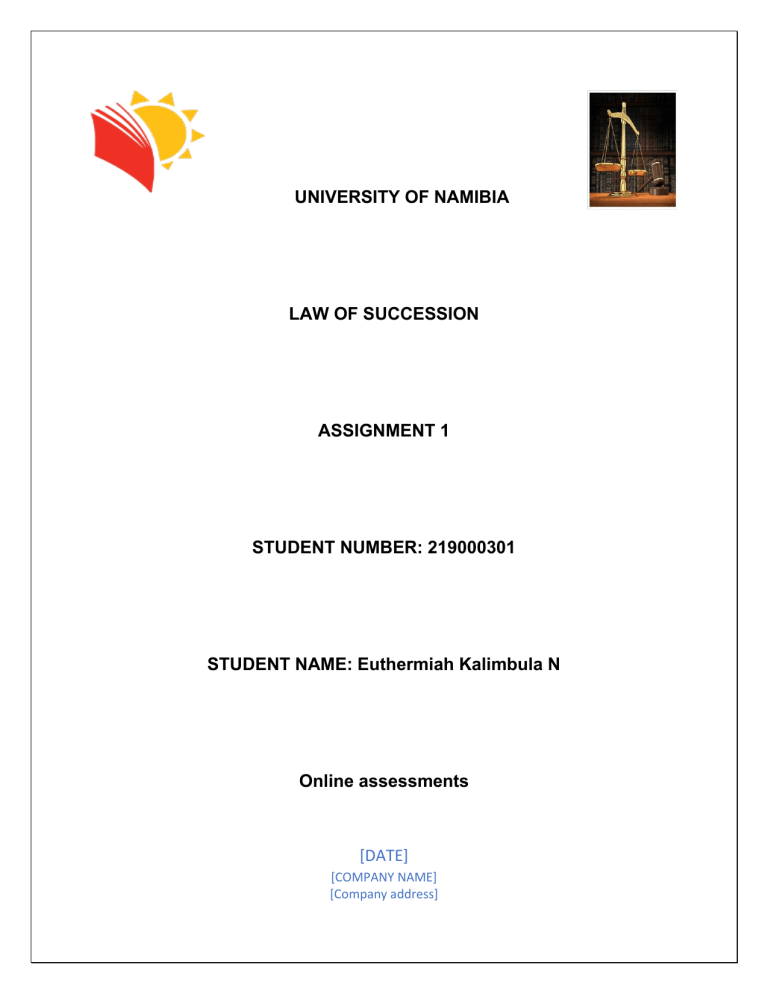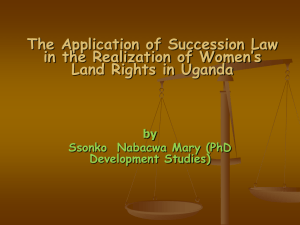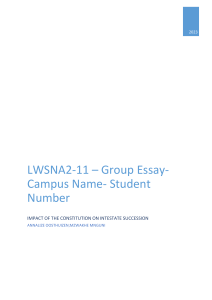
UNIVERSITY OF NAMIBIA LAW OF SUCCESSION ASSIGNMENT 1 STUDENT NUMBER: 219000301 STUDENT NAME: Euthermiah Kalimbula N Online assessments [DATE] [COMPANY NAME] [Company address] Introduction The Law of succession governs the distribution of a deceased person’s property, it is the branch of law that deals with property inheritance, it establishes the mechanisms by which property passes from one generation to the next.1 Question 1 Deceased estate exists when a person dies and leaves property or a will. The recent history of estate administration in Namibia is divided into three periods First period Before 14 July 2003 when the Berendt decision went into effect, the responsibility for supervising the administration of the deceased estate was divided along with the racial and geographical areas, the administration of whites, colored, Asian, and the testate black estate was overseen by the Master of the high court. The authority and power of the Master were (continue to be ) outlined in the administration of estates Act 66 of 1965(as amended) by the administration of states (Rehoboth Gebiet) proclamation 36 of 1941, the estates of black people who died intestate were supervised by the magistrate in whose area of jurisdiction the deceased resided and the estate of basters of the Rehoboth Gebiet were supervised by a magistrate of the Rehoboth district.2 In Berendt v Stuurman, the court invalidated the law that makes black people estate second-class citizens, they stated that several sections of the abhorrently named native administration proclamation 15 of 1928 were unconstitutional, in this case, violation of Article 10 of the Namibian constitution based on race. The case also overturned a legal provision that gives the magistrates the authority to administer “black estates” while other estates are handled by the master of the high court who has more specialized jurisdiction.3 1 Shakela, W. 2019. Law of succession study guide. University of Namibia: center for open, distance and e-learning, P 8. 2 2017. Deceased estates. Available at http://www.mohc.moj.na/a/download/deceasEstate.html; 16 March 16, 2022. 3 Berendt & Another v Stuurmann & Others 2003 NR 81 (HC) 1 Second period The master of the high court had concurrent jurisdiction with the magistrates in the estates of black people who died intestate between the 14 July 2003 (Berndt ) decision and 29 December 2005 when the Amendment Act came into effect. Any party to an estate could ask the master of the high court to supervise the estate in question under the administration of the estate’s Act.4 Third period The third period which began on December 29 2005 was the date when the amendment act went into effect had procedural changes and changes were that the administration of all cases will be overseen by the master of the high court irrespective of race or geographical boundaries. As amended, all estate must be administered by the administration of estates Act 66 of 1965. Furthermore, magistrates are to supervise intestate estates with a value less than N$100,00000 to assist in the performance of the master’sfunction intestate estates. The Master succession and which Magistrates applied to must a apply specific the specific group before rules the of intestate Amendment The act came into operation which is that the intestate of baster persons must be divided in regards to the tule set out in schedule 2 of the Rehoboth proclamation, the intestates of hites, colored, Asians, and blacks married in terms of civil law must be divided in terms of rules set out in intestate succession ordinance 12 of 1946. intestate of other black persons must be divided in terms of the customary law including black persons married out of community of property without an antenuptial contract in the area north of the police zone.5 In the case Gabriel v Nehemia, the deceased had bought the immovable property from NHE and upon his passing, his mother inherited it by way of customary law and upon her 4 2017. Deceased estates. Available at http://www.mohc.moj.na/a/download/deceasEstate.html; 16 March 16, 2022. 5 Shakela, W. 2019. Law of succession study guide. University of Namibia: center for open, distance and e-learning, P 13-14. 2 passing, the deceased’s cousin has inherited it by way of the customary law of the Ovambo tribe, the first respondent who was the deceased’s widow transferred the property in her name instead of the deceased’s cousin’s name, the applicant brought an application to the court on the basis that he was the rightful heir of the immovable property by way of customary law, the respondent who was married out of community of property argued that she is was the rightful heir of the property by way of intestate succession ordinance No 12 of 1946. The court had to determine which law applied to this case the native administration proclamation or ordinance No 12 of 1946. The court held that the rules of intestate succession in respect of black persons were published in terms of the Native Administration Proclamation, 1928 in Government Notice No.70 of 1954, the rules are that if a native dies without leaving a valid will, then the partner in a marriage of community of property shall be the rightful heir, widows, widowers, and divorcee as may be in case of the community of property or under anti nuptial contract, if the deceased does not fall in the class mentioned above then the property shall be distributed by native law and custom. It was of common cause that the parties to the proceedings were black people and the respondent was married to the deceased out of community of property. The provisions of the intestate succession ordinance never applied to black people but only applied to white persons, it is fair to conclude that had the legislature intended that the provisions apply to the estate of black people, it would have said so in clear and precise language, the court further held that the estate of the deceased is attributed in terms of customary law.6 Question 2 2.1 According to the rule in section 1(a) of schedule 2 of the Administration of estates proclamation, where the deceased is survived by a spouse and children, the spouse will inherit half of the estate, the surviving spouse and the children will inherit the remaining half in equal shares. 7 6 7 Gabriel v Nehemia 2019 NAHCMD 564 HC. Administration of estates proclamation 36 of 1941 3 In this case the deceased is survived by a spouse married in the community of property and 1 child as well as the mother of the deceased, the amount is N$ 200 000 Spouse : 200 000/ 2= 100 000 Child : 100 000/2= 50 000 Half : 50 000 Mother of the deceased: 0 So the child will receive 50 000 and the mother will receive 100 000+ 50 000(150 000) 2.2 According to the intestate ordinance of 1946, one child will receive half of the estate and the two grand children will receive the other half of the predeceased child by way of representation.8 Child: 120 000/2= 60 000 Grand children: 60 000/ 2=30 000 The child will receive 60 000 and the remaining 60 000 will be given to the grandchildren in equal shares, each grandchild will receive 30 000. Question 3 The principle of freedom of testate succession is a liberal principle that ensures the testator’s expressed desires to be honored, it allows the testator to direct how their estate is distributed when they die.9 The content of the will is left to the discretion of the testator and they’re free to appoint whoever they want in their will. Article 16 of the Namibian constitution provides the right to property to all persons in any part of Namibia to acquire, own and dispose of all forms of immovable and movable property individually or in 8 Intestate Succession Ordinance 12 of 1946. Freedom of testation: A founding principle of law by S. Torr. Available at: https://crue.co.za/freedom-oftestationa-founding-principle-of-law/ Last Accessed: 17 March 2022. 9 4 association with others and to bequeath their property to their heirs or legatees.10 Once a person dies his / her will is required to be scrutinized by the master of the high court to establish the validity of a will. There are however some limitations to the freedom of testation doctrine. Common law limitations The courts will not enforce a testators discretions that are contrary to public policy ( contra bonos mores), an example of this would be a condition that interferes with the beneficiary’s marital status and the conditions that limit a beneficiary’s ability to inherit, the court will also not enforce conditions that are impractically vague and impossible, furthermore, a person’s minor children have a common law claim for maintenance against his or her estate.11 in the case of Minister of education v Syfrets trust, the deceased provided in his will for the establishment of charitable trust award bursaries to deserving non-Jewish and male Europeans, the minister of education questioned the constitutionality of these terms alleging that they discriminated unfairly against other potential applicants based on race gender and religion and were thus contrary to public policy. The court held that the provisions of the trust were indeed against public policy and that the conditions be deleted because they constituted unfair discrimination and are contrary to public policy.12 Conclusion In conclusion, this paper discussed the origin and history of intestate succession administration, divided into three periods. Furthermore, we discussed the doctrine of freedom of testate succession and its common law limitations. 10 The constitution of the republic of Namibia Shakela, W. 2019. Law of the succession study guide. University of Namibia: center for open, distance and elearning, P 92. 12 Minister of education v Syfrets 2006 (4) SA 205 (C). 11 5 Bibliography Books Shakela, W. 2019. Law of the succession study guide. University of Namibia: center for open, distance, and e-learning, Cases Gabriel v Nehemia 2019 NAHCMD 564 HC. Berendt & Another v Stuurmann & Others 2003 NR 81 (HC) Minister of education v Syfrets 2006 (4) SA 205 (C). Internet sources 2017. Deceased estates. Available at http://www.mohc.moj.na/a/download/deceasEstate.html; 16 March 16, 2022. Freedom of testation: A founding principle of law by S. Torr. Available at: https://crue.co.za/freedom-of-testationa-founding-principle-of-law/ Last Accessed: 17 March 2022. Statute Administration of estates proclamation 36 of 1941 The constitution of the Republic of Namibia Intestate succession ordinance 12 of 1946. 6




